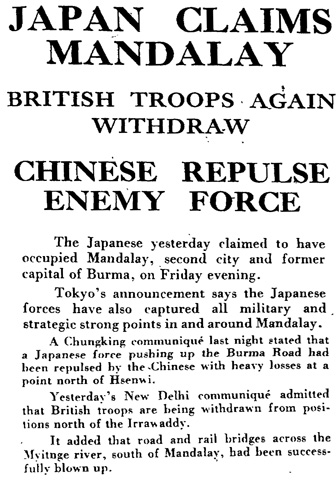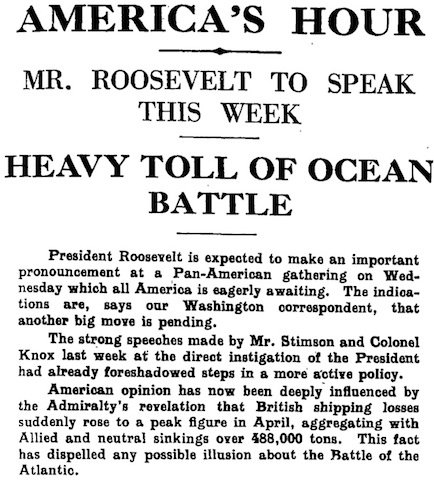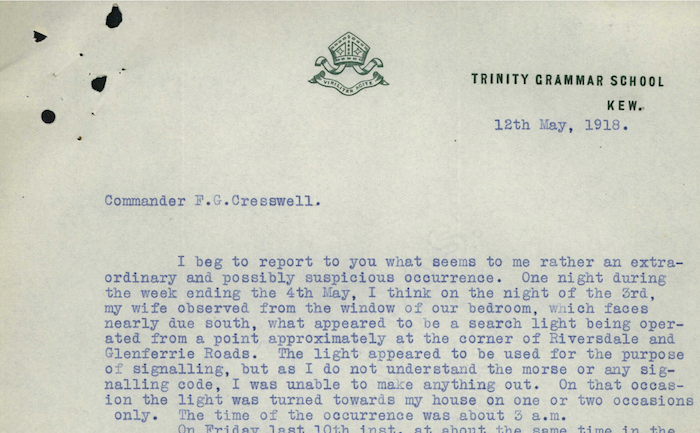
The Observer reports that Japan now claims to have captured Mandalay, 'second city and former capital of Burma (5). This seems not to have been confirmed by official British sources yet; however
It was stated in authoritative circles in London yesterday that with Lashio already in enemy hands, it would not be worth while suffering great losses to defend Mandalay.
That fits in well with more official statements: New Delhi has 'admitted that British troops are being withdrawn from positions north of the Irrawaddy'; 'Two spans of the famous Ava bridge, about eight miles below Mandalay, have been successfully blown up' (by retreating British forces, it is implied); and
The great Yennanchung oilfield in West Central Burma has been completely destroyed in accordance with the British 'scorched earth' tactics.
This was the most productive oilfield in the Empire after Trinidad; it will take 'vast quantities of new equipment and machinery handled by experts' to get it working again. A Scot named Mark Grieve, twenty-five years chief engineer at Yenangyaung oilfield (possibly the correct spelling of Yennanchung) helped the military destroy his life's work; he told Daniel Berrigan for the British United Press that it would take the Japanese 'at least a year to get any production at all, and they haven't got them'. Berrigan also interviewed some British -- actually mostly Irish, it seems -- soldiers and from them gained some idea of the fighting on the Irrawaddy front. Some 'Traitor Burmans', for example, were fighting on the side of the Japanese, and 'Many of the Irish bore wounds inflicted by the favourite Burmese weapon, the dah, a heavy curved sword'. In one strange incident, a patrol spotted 'Over 100 Japanese wearing Burmese costume [who] came out from one village holding a big white flag with the Japanese flag in the corner'. The Allied troops were outnumbered, even with tank support, and so 'had to retire'.
A military correspondent thinks that the Germans have delayed their offensive in the east as 'a bait to the Russians or to us to encourage us to do something rash which would give him a chance to strike back' (6). It could be that this strategy is working, as a report on another page says that (5):
Marshal Timoshenko's army, striking hard to forestall the threatened Nazi offensive against the Caucasus oil region, have driven a deep wedge into the German lines south of Kharkov.
This means that any German offensive from Kharkov southwards 'will now be threatened from the flank'. There has also been activity in Libya recently, despite the 'gasping, choking' effects of a Saharan sandstorm in which 'Military operations are blotted out, aircraft grounded, and all movements paralysed save along well-marked roads'. In the last week the Germans have extended their flank southwards to Tengender, 'to prevent flanking incursions, which they dislike above all else'. The British are also 'deepening and consolidating their position, with the result that for the first time desert warfare has assumed an aspect of fixed-position war'. But this can't last: as General Ritchie said recently, 'the Libyan war won't be won "by sitting on our backsides"'. As an example of not sitting on backsides, a report from South Africa, unconfirmed by London, says that 'a long-range British patrol in the Libyan desert has raided the headquarters of General Rommel but [...] Rommel was not there'.
The King and Queen paid a 'surprise visit' to Bath yesterday, and 'surveyed the damage done in the Nazi raids last week-end'.
Quickly the news of their presence spread and hundreds of citizens gathered to cheer them. At the first point where they left their car the King and Queen climbed over heaps of stone from wrecked houses to talk to a group of women who survived the raid.
"It is very encouraging of you to come here, Your Majesties," one grey-haired woman said.
"We were anxious to come and see how you are all getting on," the King told here."
The Queen's reactions are emphasised: '"It is terrible," [...] the Queen shook her head sadly at the devastation [...] "It is splendid to hear that you are carrying on like that," [...] "It makes us very proud of you." She also 'gave the Mayor of Bath three big parcels [which] contained blankets and other comforts for the bomb victims', and saw in action 'a Queen's messenger food unit', one of a number of convoys 'sent out by the Queen from Buckingham Palace'.
A military exercise was held in Westminster last night, 'the greatest invasion test London has ever staged'. 'Violent air raids, aimed at causing panic and confusion, were imagined as a prelude to the real attack' and 'Fifth Columnists prepared the way for invaders'.
More than 1,500 'paratroops' and 'airborne' troops landed in the Westminster area. Fully armed and equipped with a large number of tommy-guns, the invaders caught the defence somewhat by surprise. Street fighting ranged over a wide area, particularly near Victoria Station. Where the defenders were outnumbered they used delaying tactics and retired behind smoke screens.
The fifth columnists planted a bomb in a government building and, 'entering a postal exchange in the guise of workmen, endeavoured to blow it up', while
Invaders captured a barge near Chelsea and sent a platoon to storm the Houses of Parliament from the river.
It all seems to have gone off very well, though official results won't be known for a while.
![]() This work is licensed under a Creative Commons Attribution-NonCommercial-NoDerivatives 4.0 International License.
Permissions beyond the scope of this license may be available at http://airminded.org/copyright/.
This work is licensed under a Creative Commons Attribution-NonCommercial-NoDerivatives 4.0 International License.
Permissions beyond the scope of this license may be available at http://airminded.org/copyright/.





Erik Lund
Haven't the Fifth Columnists given it over, what with Russia being in the war and all? People, with their crazy labels, I think to myself, mainly thanks to having clicked on the link for "dahs" and being treated to some folk history of Southeast Asia, complete with grand migrations of peoples in all directions. (Which can be traced from peculiarities of knife/sword design.)
Alex
Early modern Burmese hereditary oil-well women, recognised by British colonial law. I didn't expect to meet that but there you go.
Brett Holman
Post authorErik:
But the Fifth Columnists are always with us. (Not Sixth Columnists, though, that would be silly.)
Erik Lund
Sixth Column, per Robert Heinlein. It's even vaguely topical. And here's an inadvertently hilarious attempt to explain that it's not racist. The pdf still seems to be available through Baen, here.
Brett Holman
Post authorYes, I read that several times as a kid. (In my defence, I read everything I could find by Heinlein several times as a kid.) I stand by what I said!